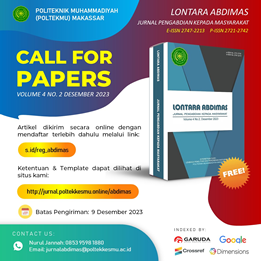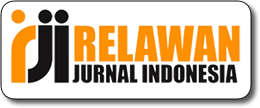Penyuluhan Tentang Demam Berdarah (DBD) dan Tanaman Pengusir Nyamuk Di Lingkungan Kecamatan Manggala Kota Makassar
Abstract
Manggala District is one of the sub-districts in Makassar City which often faces cases of Dengue Fever. Dengue fever is a disease transmitted through the bite of the Aedes aegypti mosquito. The breeding of Aedes Aegypti is increasing due to the increasingly crowded conditions of buildings and housing. These mosquitoes not only live in dirty water environments, but also in clean water such as bathtubs, water reservoirs, and others. Some community members still have limited knowledge and understanding of effective ways of dealing with dengue cases, as well as the use of plant species that can be used to repel mosquitoes. The purpose of the service is to increase the knowledge and understanding of the community about dengue fever and the use of mosquito repellent plants. The extension method is the presentation by the extension team, the discussion stage, and the evaluation stage. The results show an increase in public knowledge and understanding of dengue disease and the use of mosquito repellent plants. The conclusion is that the community finally knows the dangers of dengue disease and knows the types of mosquito repellent plants.
References
Liputan6.com. 2020. Kemenkes: Ada 95.893 Kasus DBD di Indonesia sepanjang 2020.https://www.liputan6.com/health/read/4425271/kemenkes-ada-95893-kasus-dbd-di-indonesia-sepanjang-2020. Diunduh tanggal 30 Mei 2021.
Mulyani S, Mulyaningsih B, Lestari A.W, Ana F, Anna D,S. 2013. Insence Combustible Sereh, Cengkeh, dan Jeruk Sebagai Penolak Nyamuk Aedes Aegypti. Traditional Medicine Journal. Vol. 18(3), p 195-200. ISSN: 1410-5918. Universitas Gadjah Mada, Yogyakarta.
Setiyawan H, Lestari, A.S, Ayungnityas, E.N, Meradji, A, Diana, E, Utami, E.B. 2019. Penyuluhan Demam Berdarah Dengue (DBD) dan Tanaman Pengusir Nyamuk di Desa Modalan Banguntapan. Jurnal Pemberdayaan: Publikasi Hasil Pengabdian kepada Masyarakat.ISSN: 2580-2569; e –ISSN: 2656-0542. Vol. 3 No. 2, Hal: 241-244. Polteknik Kesehatan Bhakti Setya Indonesia, Bantul, Yogyakarta.
Sahamastuti A. T, Siratan E, Leonard T, E, Tjugianto G, E, Hartiadi L, Y, Agusta I. 2019. Penyuluhan dan Workshop Obat Nyamuk Sintetis dan Alami Sebagai Tindakan Pencegahan DBD. Jurnal Pengabdian dan Pemberdayaan Masyarakat. ISSN: 2549-8347 (online), ISSN: 2579-9126. Vol. 3 No. 2. Fakultas Bio Sains. Indonesia International Institute For Life Science. Jakarta Timur.
Ulfa A.M, Narista N, Sobirin. 2019. Penyuluhan Penyakit Demam Berdarah Dengue (DBD) di Puskesmas Gadingredjo Pringsewu. Jurnal Pengabdian Farmasi Malahayati. Vol. 2 No. 2. Program Studi Farmasi Universitas Malahayati.
Vitaningtyas Y, Agustiningrum M, Shella, Prisilia C, Putri C, E. 2019. Pengolahan Serai Sebagai Tanaman Obat Pengusir Nyamuk Bersama Anak-Anak di Pemukiman Pemulung Blok O Yogyakarta. ABDIMAS Altruis Jurnal Pengabdian Kepada Masyarakat. Vol. 2 No. 1. e-ISSN: 2620-5513. P-ISSN:2620-5505. Universitas Sanata Dharma. Yogyakarta











